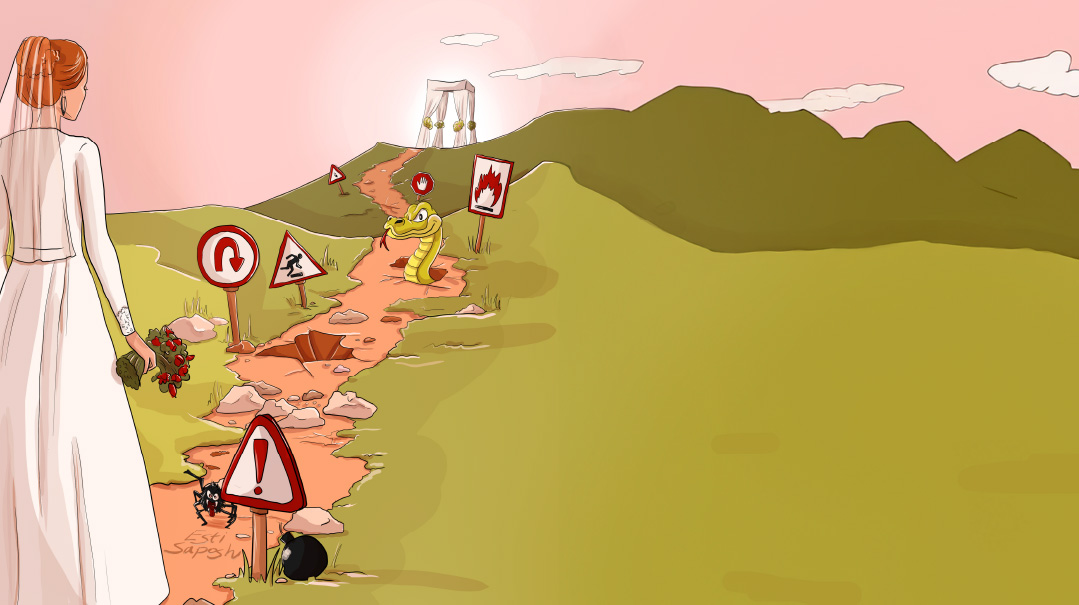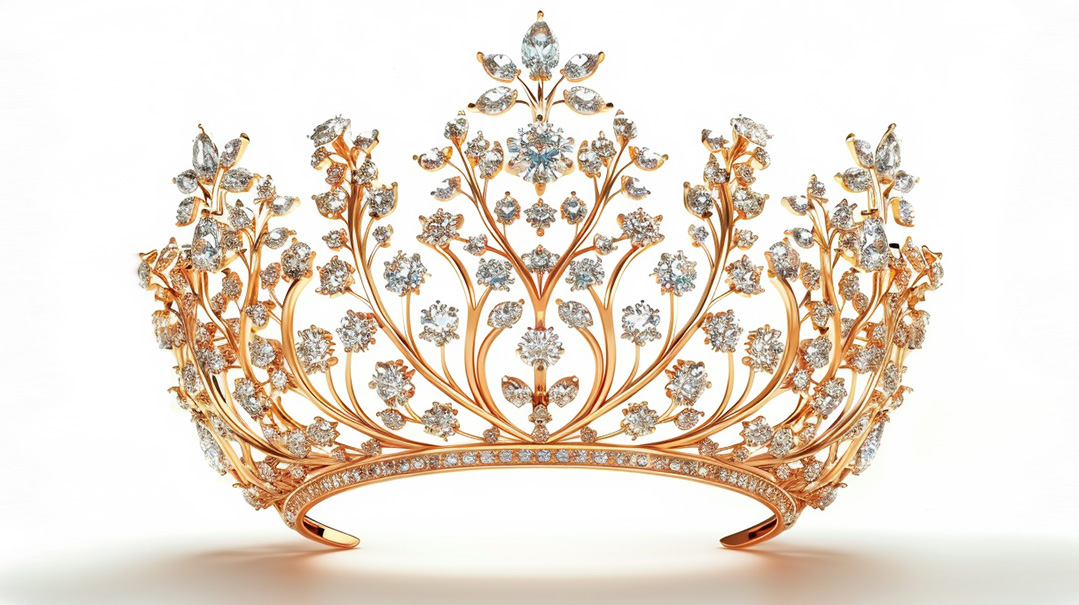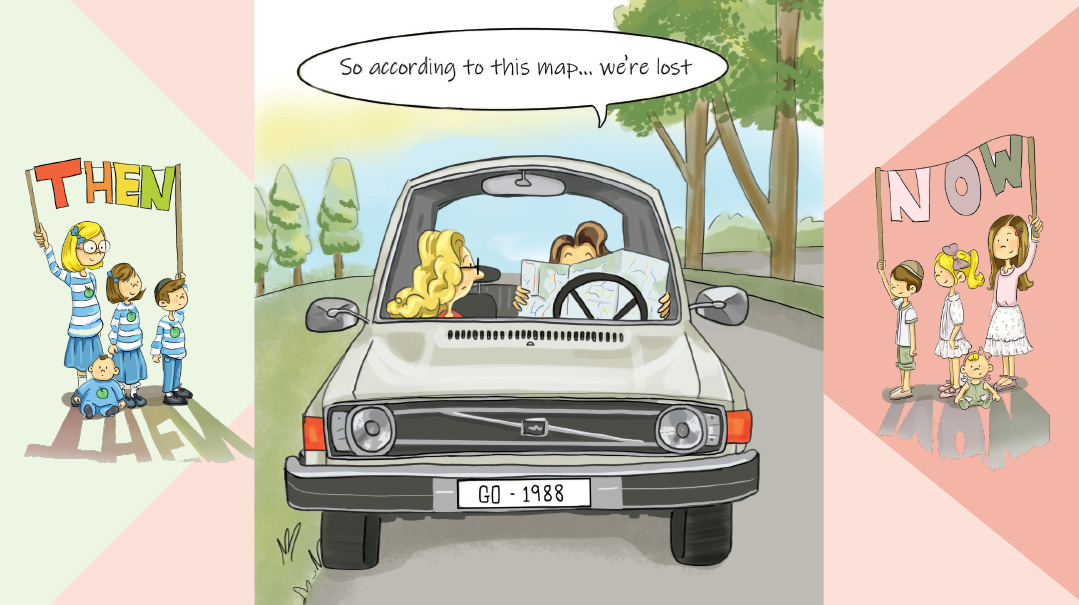The Rocky Road to the Chuppah
| January 9, 2024Five women share stories of what they did at a dating crossroads — when they needed to marry or move on

Three dates with my future husband, and I knew he was my zivug. Yehoshua was thoughtful and considerate in a way I hadn’t experienced before. It was the little things. He always held the door for me. If he was going to be more than five minutes late, he would call to let me know. He asked what I’d like to do on our date, but had a plan in case I didn’t. He even kept a cup of ice and a can of seltzer in the cup holder of his car in case I got thirsty on the traffic-prone drive from Queens to Manhattan. I mean, who does that?
But it wasn’t just superficial things. Yehoshua had the combination of worldly knowledge and Torah learning that I had been having a hard time finding. He was interesting, artistic, and well-rounded.
It didn’t take me long to realize I was going to marry Yehoshua. In my mind, the only thing left to do was choose the caterer and book the hall.
Unfortunately, he had other ideas.
At the end of our fourth date, Yehoshua got serious. “I think we should take a break.” He explained that he wanted to take some time to think things over.
I shook my head. “Now’s not a good time for a break.” I was calm but firm.
“Ah, okay,” he said. “When do you want to go out again?”
“Sunday’s good. Pick me up at twelve?”
He would try to break up with me again after our fifth date, and then again after our sixth. Each time I refused to be broken up with.
“If I keep this up,” I joked to my friends, “he might just find himself at the chuppah with no clue how he got there.”
But inside, I wondered. Why was he trying to end it? We had such a great connection. Our conversation always flowed. We never stopped laughing when we were together. Was he going on the same dates that I was?
After the seventh date, the shadchan called to break things off, and this time it was for real. I accepted that it wasn’t meant to be and started going out with other people.
But what I didn’t know was that I had made an impression on Yehoshua. He couldn’t forget about me so easily. Ten months later I heard from the shadchan. Yehoshua wanted to give it another try. Was I interested?
Nine years and two kids later — the rest is history.
It was only much later that Yehoshua admitted his reservations. We were from very different backgrounds. I’m a baalas teshuvah from Queens. He’s from a black-hat family in the Five Towns. I have one sister. He’s one of seven. He was taken aback, to put it mildly, when I would show up on our dates in sneakers. I’d learned about tzniyus and had been observing it carefully for years, but I hadn’t taken the time to learn the more nuanced code of Orthodox cultural standards. Would I be the right fit for his heimish family?
Some couples are lucky. They know right away when they’ve found their bashert. But many people have a rocky road to the chuppah. They’re beset with doubt and confusion.
When you feel doubt, how do you know whether it’s a sign to end things or to push through it? How do you decide if the person sitting across from you is going to be the person you spend the rest of your life with and the father of your children?
Here, women share stories of what they did when they knew they needed to marry or move on.
Ariella, Manhattan
When I saw the picture that came with my future husband’s résumé, I didn’t want to go out with him. I joked that his photo made him look like a 17th-century pirate, with his long pointy beard and moustache. He also wore a sweater with a mismatched tie. My friend and dating advisor, who was 13 years older than me, convinced me to give it a try. “Beards can be trimmed,” she said, “but you’ll never know if he’s your bashert until you meet him.” Our hashkafos and backgrounds were perfectly aligned; we were both divorced with one child. The references I checked were glowing. The only issue holding me back was his photo, so with trepidation, I agreed to go out with him.
I took a bus to meet Daniel. We’d made plans for him to meet me at the bus stop. When I saw him in person for the first time, at night, standing under a lamp post, I stopped in my tracks. There was a lot to take in: Daniel was wearing a long brown overcoat, a maroon tie with orange circles, and navy shoes. His moustache grew into his mouth, which made him look as if he didn’t have lips.
When we sat down and talked, I could tell that he was such a nice guy. A real mensch, but a question was niggling at the back of my brain all night. Finally, I blurted out: “If we get married, can I choose your clothes?”
He took it in stride. “Sure, just don’t make me look crazy.”
Yeah, wouldn’t want that, I thought to myself sarcastically.
After the date, I spoke to my dating advisor, who reminded me that the exterior stuff is easy to change. It’s much harder to change who someone is on the inside. Do you have all the same values? The same hashkafah? Do you want the same things in life? Does he have a good heart?
I had to answer yes to everything, so I agreed to give him another date.
Daniel came to all our dates wearing crazy ties. He’s a very tall man, but his ties were always comically short, with ridiculous patterns and colors.
“You chose this tie?” I asked him, when he showed up on our second date in one of those absurd numbers. “You actually went to a store, looked at all the ties, and said, ‘This is the one I want’?”
“No,” he replied. “I just grab any tie. A tie’s a tie, right?”
And don’t even get me started on his glasses.
He must have owned the first pair of transition lenses ever made. They stayed brown all the time. I didn’t know his eyes were blue until he took his glasses off on the third date.
“No one has 100 percent of everything you’re looking for,” my dating mentor told me. “But does he have what you need?”
I’d been married before. I was a little older. I knew how much a good heart mattered, and he was truly one of the nicest guys I’d ever met.
He had what I needed. When he popped the question, I knew that despite his bizarre fashion choices, he’d make a great husband.
We’ve been married ten years and have two kids together. For the sake of shalom bayis I choose all his clothes. Right after the wedding, I asked him to do something about his pirate beard. He didn’t want to touch it. “A man’s beard is holy!” he argued.
“Go ask three rabbis if your beard is more important than our shalom bayis,” I told him.
The rabbis agreed with me. He fixed his beard as well as his too-long moustache.
My mentor was right. I’d take overgrown hair any day — as long as it’s covering up a good heart underneath.
Shoshana, Queens
When I was introduced to Yaakov, I was at a place in my life where I was really feeling desperate. I was 30 years old, and my younger sister was already married with a baby. I loved being an aunt, and I was always at my sister’s apartment, spending time with my niece. But as much as I loved being an aunt, it hurt that my younger sister had already achieved what I wanted so badly — a loving husband, her own household, an adorable baby. I had a fulfilling career as a nurse practitioner, great friends, and a supportive family. But I felt as if there was a huge hole in my life that only getting married could fill.
On our first date, Yaakov took me out to eat, and we spent hours talking about our careers. I explained what it took to become a nurse practitioner and what my job was like, and he listened intently. I liked that Yaakov was smart and ambitious. He was a lawyer and spoke about how he planned to make partner one day. I also found his interest in me very flattering — immediately after our date ended, he told the shadchan that he was interested in seeing me again.
There were small things about Yaakov that bothered me. He did a lot of the talking on our dates, and most of our conversations centered around him. I would ask about his day, and he would tell me about it at length, but he didn’t always remember to ask about mine. He drove a little more aggressively than I liked — occasionally speeding, or cutting off a car, but nothing too dangerous. Despite his great career, he wasn’t a good tipper, and I couldn’t help but notice the waitresses’ disappointment when they saw their tips. Yaakov didn’t make as much time for Torah learning as I would have liked.
But Yaakov was always very attentive to me. He called me a few times a week, opened the car door for me, and made sure I was comfortable with the temperature. He always paid the bill when we went out, and most importantly, he made it clear, very early on, that I was what he was looking for. He liked that I was smart and career-oriented like him, and told me he’d had a hard time finding someone like me who was career-focused but also wanted a family. I had dated men in the past who were unsure about their feelings, or who had commitment issues, so I really liked that he was so sure that he saw me in his future.
I never had strong feelings for Yaakov, because his personality wasn’t what I was used to. My father is a soft-spoken, low-key man, and Yaakov was the opposite. But I could see the benefits of marrying Yaakov. He would be a good provider and defender (no one took advantage of Yaakov or his family!), and I would finally be married. After watching all my friends get married, and feeling like the last single woman alive, that was worth more than I cared to admit. Yaakov was eager to get engaged, and when he proposed, I accepted.
After the engagement, a lot of disagreements came up. I wanted a bigger wedding, and Yaakov wanted a smaller one. He wanted a dog, and I didn’t. He wanted to live in New Jersey, and I wanted to stay in Queens. Most engaged couples probably have similar disagreements, but I didn’t like how he argued. “The girl always moves to where the boy lives. End of story.” Or, “We’re not spending that on flowers. I hope after we’re married, you don’t expect to live the princess lifestyle.” I would leave our arguments feeling frustrated and belittled. I felt like he hadn’t heard or considered my point of view.
When I started spending more time with his mother, I understood where he had learned how to speak to people. The funny thing was that his mother was always nice to me. She told me she thought I was perfect for her son, but I couldn’t stand the way she treated her other daughter-in-law. She would speak down to her and be very dismissive of her.
The final straw was the prenup. I didn’t mind getting a prenup, since we both had successful careers, but Yaakov wanted the terms to be entirely advantageous to him. He said if we lived in Queens for a few years, which was one of the ideas we had considered, then I would have to compensate him financially for every year he had lived there if we divorced. When we were negotiating, he saw me as an adversary in his law firm, instead of as his kallah. If this was how he negotiated the prenup coming off the high of our recent engagement, what would happen when the excitement wore off? I realized that I couldn’t marry him. I broke things off. Yaakov was livid and told me I’d regret it one day.
It took me five more difficult years to finally find my bashert, but you know what? I never did regret it. Even during some really hard, lonely times, all I felt was relief when I thought back to Yaakov. It felt like a huge weight had been taken off my shoulders. I knew that we wouldn’t have a happy marriage, no matter how successful he was. I never looked back, and today I’m happily married to someone else.
Michal, Silver Spring, Maryland
Shlomo and I hit it off right away. We had so much in common, and he was thoughtful, sweet, and caring. I really thought I might have found my bashert.
Then came our third date. “I have something to tell you,” Shlomo said. “I’ve had Crohn’s disease since I was a child. It’s an autoimmune disease that causes the digestive tract to be painful and inflamed. It’s been a big challenge in my life, but it’s something I’m managing. You’re welcome to ask me anything you want about it.”
After our date, I did a little research into the disease. It’s an unpleasant medical condition, but treatable with medication. With the advice of my parents, I decided to continue dating him. I felt that Crohn’s was something I could live with.
Shlomo was such a sweetheart. Whenever I had a problem, he always tried to solve it for me. When I told him there was no kosher food where I worked, he researched the neighborhood, and found a Chabad house near my office that sold lunch. When he hit a car in a parking lot, he was perfectly calm about it, and so quick to leave a note for the car’s owner. I loved how he handled things.
But as we continued seeing each other, he had more news for me: “I’ve tried conventional medicine and it hasn’t worked for my condition. I do a treatment that’s not legal in the United States. I go to Mexico to have hookworms put in my stomach. Studies have shown it’s safe and works for Crohn’s and other autoimmune diseases, but the FDA bans it anyway. I also buy chemicals from India and make my own pharmaceutical products from manuals I’ve read on the Internet.”
Now I was getting freaked out. I spoke to a doctor who’s a family friend, and he was really shocked by what this guy was doing. He said that the medical establishment had pioneered a lot of medications to help with Crohn’s disease treatments, and this young man should give them another chance.
I mentioned it to Shlomo, but he explained that he felt he’d tried everything already. “This is what works for me,” he said firmly. “It saves me from debilitating pain.”
I felt it wasn’t my place to push him on it, but I told him on our date that it was all too much for me. We had such differing views on medicine. How would these play out, I wondered, if we married and had children? Shlomo looked crushed, and I felt like my heart was breaking, too.
I didn’t regret ending things with Shlomo, but I did regret hurting him. He was a very special person, and I hope he found his bashert. I got married to someone else not long after, and our views toward the medical establishment are much more aligned.
Bracha, New York City
Ephraim was very funny, smart, and charming, and I had a great time on our first date. We continued to date for a few weeks. Ephraim spoke about his family a lot, which I appreciated; it showed that he was family-oriented. I’m also close to my family, so that was an important value we had in common — or so I thought.
The first time I noticed something was off was when we were in the middle of dinner, and his married sister called. Ephraim spoke to her for ten minutes. “Yes, I’ll be there soon,” I heard him say. “It’s going to be all right. I’ll take care of it.”
“Is everyone okay?” I asked, when he hung up the phone.
“My sister just realized there’s a family of mice living in her cupboard, so she’s practically having a panic attack. She wants me to come over after our date and set up traps.”
We finished our dinner quickly. He got the bill and drove me home so he could take care of his sister.
Ephraim had explained to me that his parents were divorced, and his father was pretty much out of the picture. Ephraim had basically been the man of the family since he was a young teenager. His sister was married with a large family, and it seemed to me that both his mother and his sister always expected him to drop everything and come when they called.
We had one date interrupted when his mom had a burst pipe in her bathroom, and we were interrupted another time when his sister needed someone to pick up her daughter from gymnastics.
“You know this isn’t normal, right?” I told him.
“They’re my family,” Ephraim said defensively. “Your family is important to you, too, right?”
His mother was very sweet and always nice to me, but her reliance on Ephraim was starting to feel like an obsession to me, and frankly, it left me feeling nauseated. On the one hand, she treated him like the man of the house, yet on the other hand, she spoke to him like a child. She called him “Shnookums” and other pet names, and was constantly cooing over him, urging him to eat, and worrying about whether he was getting too skinny.
If we were on a date when his mother called, and he told her he had to go, she would get very upset, and he’d have to spend a long time calming her down.
After one frustrating date that was cut short because his mom needed a ride to a doctor’s appointment, I called my best friend. “Run, Bracha!” She was almost yelling into the phone. “Run and don’t look back. You do not want to marry into this crazy family.”
I wasn’t ready to call it off. I liked everything about Ephraim, and even the fact that his family counted on him was proof that he was reliable, responsible, and loyal.
But one day when his mother called him once again during our date to complain that the shopper at the grocery had sent her all the wrong items, and she wanted Ephraim to call and demand they fix it, I snapped. “I can’t see myself marrying someone who puts me second. I don’t think this is going to work out.”
Ephraim was shocked. He promised that he would put me first from now on. I said that I was only willing to continue the relationship if he saw a marriage therapist. He said he’d think about it, but “thinking about it” wasn’t enough for me, so I ended things.
A few weeks later, I got a call from Ephraim. He understood why I was upset, he missed me, and he wanted to know if I would continue seeing him if he saw a marriage therapist.
I knew he was a really good guy, so I agreed to go out with him again. He started working with a marriage therapist and he learned over the next few weeks how to individuate from his family, and set healthy boundaries.
We dated for longer than was expected in my community because I wanted to make sure he had really done the work before we got engaged. Ephraim told his family that when he was on a date, they couldn’t call him unless it was an actual emergency, and he had to spell out what that meant — a fire, someone in the hospital, a tornado — not a nephew that needs to be picked up from camp, or a leaky roof.
When we had six dates in a row without a single phone call from his family, I felt that I was ready to get engaged.
We’ve been married now for seven years. There were a few times in the first year of our marriage when we had to go back to the therapist and hash out how much time was “normal” to give to your mom and sister versus your wife, but ultimately, we worked everything out. And all those good qualities that I saw him give his family — devotion, generosity, attention — he now gives to me and our three children.
(Originally featured in Family First, Issue 876)
Oops! We could not locate your form.







